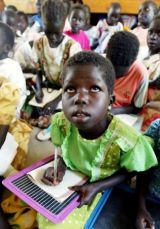Education desperately needed in post-war southern Sudan
RUMBEK, Sudan, Jan 18 (AFP) — The United Nations is making education a priority in post-conflict southern Sudan, saying it is crucial to developing a region where school enrollment is among the lowest in the world and illiteracy at alarming rates.

|
|
A Sudanese girl listens to her teacher as she attends a class along with over 150 other girls at Rumbek primary school in Southern Sudan April 19, 2004. |
“It seems to me the single most valuable thing you can give to the people of south Sudan is education,” said Ben Parker, communications officer for the United Nations Children’s Fund (UNICEF).
“You can’t run a country without educated people,” he added.
On January 9, rebels and the government in Khartoum signed a final peace agreement in Kenya, ending Africa’s longest conflict that had claimed at least 1.5 million people and displaced four million others over the past 21 years.
The UN Security Council has promised to consider sending aid and even peacekeepers — reportedly as many as 7,000 troops — to keep the peace there.
The UN also says education is a priority, with enrollment at primary school as low as 20 percent, the second lowest in the world after Afghanistan.
With an estimated population of 7.5 million, the region also has one of the lowest literacy rates in the world, trailing the west African state of Niger, which has a literacy rate of 24 percent.
UNICEF says the statistics are particularly disturbing for women, with one out of 10 illiterate. Figures suggest that only one in 100 girls will complete primary school in southern Sudan — the worst rate in the world.
In an effort to encourage girls’ education, the UN agency has helped establish specialized girls’ schools across southern Sudan which run three-year programs before pupils are re-integrated into mainstream schools in the fifth grade.
A fact-finding study showed that many parents fear sending their daughters to school for security and cultural reasons, or because their girls may no longer have time to help with the housework.
UNICEF’s specialized girls’ schools in villages run for three hours a day, compared to between seven and eight hours in regular schools.
One such school is the Moper Community Girls School (MCGS) established in 2002 in Rokwach, a village outside the southern town of Rumbek, seat of the rebel Sudan People’s Liberation Movement.
Initially, the school was a single mud hut with a grass-thatched roof for 35 pupils, but with more and more parents interested in sending their girls, another classroom was needed.
The model was “an effective way of bringing girls into school”, said Charles Avelino, an assistant project officer for UNICEF’s education programme.
“We let parents decide when classes should begin,” he added.
Before the MCGS was launched, the nearest school was an hour and a half walk away.
UNICEF established 174 of these specialized schools across southern Sudan in 2004, raising the total number of girls attending to more than 5,000.
They are one-teacher, one-class facilities with a maximum of 35 pupils in a class, Avelino explained. “The girls are interested in learning,” said Peter Kon Mayak, a teacher at the MCGS.
Teachers from the local community teach the three-year programs, taught in the local language. Subjects include English, maths, social studies and science.
Many of the pupils go bare foot. They wear no uniforms and sit on mats brought from home, laid out on the dusty floor. But they are ambitious.
“I want to work in an office,” said eight-year-old Elizabeth Ayen Maker, a pupil at the MCGS.
English is her favorite subject. She wants a better life and to be able to help her parents after completing school.
UNICEF expects demand for such schools to increase considerably with the arrival of peace as refugees return from neighboring countries.
It has appealed for an additional five million dollars to boost its budget of five million.
Only about seven percent of teachers in the south have any professional training, more than half of the schools are taught under a tree and some 1.5 million children that should be in school are not.
The war in the region erupted in 1983 when rebels from the mainly Christian and animist south took up arms to end years of domination by successive Islamic governments in Khartoum.
